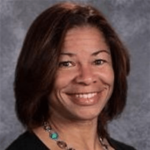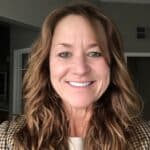Nesha Pattison is an anomaly in an atypical California school district. Since 2018, Nesha (pronounced na-SHAY) Pattison has served as director of charter services in Acton-Agua Dulce Unified School District, a small district on the outskirts of Los Angeles County about 50 miles north of downtown LA.
The district has 14 public schools; 11 of them are charters serving more than 12,150 students, which represents more than 11 times the enrollment in the district’s schools. Ten of the charters are online schools or hybrids, meaning they have some online and some classroom-based learning. Nonclassroom-based charters statewide have come under more scrutiny in the continued aftermath of the largest charter school fraud in California history, in which the operators of A3 Charters pleaded guilty in 2021 to stealing at least $400 million dollars in state education funds.
In the aftermath of that scandal, and given the sheer number of virtual programs in the district, Pattison could be forgiven if she had responded by cracking the whip-hard. But charter school leaders say that although she has implemented more stringent, transparent, and thorough processes, she has done so with equanimity and teamwork.
“It’s very thorough, but it still has the spirit of ‘we’re in this together to do better for kids’,” said Jessica Spallino, the CEO of Method Schools, an online program with students in TK through 12th grade.

Bryan Gillespie (3rd from right) at Options for Youth-Victorville 2023 graduation
Bryan Gillespie, principal of Options for Youth: Victorville, a hybrid program with students in 7 through 12, concurred that Pattison’s approach has “been really collaborative. She has really tried to set us up for success.”
Disaster Preparedness (and other sound practices)
Acton-Agua Dulce did not have to start from oversight scratch too respond to concerns prompted by A3. COVID-19 had seen to that. Plus, Pattison had already implemented some procedures to streamline processes, including an online portal for schools to upload mandatory reports and documents. But A3 impelled additional vigilance that does not apply only to online education, she argued.
“A con artist is going to be a con artist, and the con artist will con everybody,” she said guilelessly. “I think [A3] just amplified how difficult it could be for anyone to be able to identify fraudulent types of behaviors.”
In the A3 case, for example, the operators overcharged the state by playing fast and loose with enrollment figures, something that Pattison said could happen in any school.

Nesha Pattison, Director of Charter Services, Acton-Agua Dulce Unified School District
“I can go into one of my charters that has students sitting down, but that’s a snapshot in time; I don’t know if that student came back three days later or if that student disenrolled and went to another school the day after I left,” she said. “It’s not like you’re sitting counting those students every single day.”
Instead, Pattison requires regular updates-in attendance, student retention, finances, test scores, graduation rates, and academic improvement. She visits every school either in person or online during live sessions or recorded classes, studies their files and budgets, and reviews compliance with special education laws and progress of English learner students.
She also meets with each school’s leaders three times a year and together they use that data to monitor progress toward meeting benchmarks. At the beginning of the school year, they summarize the previous year’s progress and set new, sustainable goals.
In the middle of the year, they discuss early benchmarks, including enrollment changes, staffing, operations, movement on new support initiatives, and plan for site visits.
“At the end of the year, it’s kind of packing up all of the early and mid-year information,” explained Pattison, and discussing changes the schools may need to consider if they are not on the right track.
She also shares positive feedback and offers ideas either from other charter schools, from CCAP workshops, or from one of the monthly Charter Chats presented by the Charter Authorizer Support Initiative (CASI), a grant managed by the California Department of Education, CCAP, and the Santa Clara County Office of Education.
Because she has built goodwill through open and respectful relationships with school leaders, they are more open to her feedback and recommendations.
“I always value the fact that she comes in with an open mind.”
Gillespie looks forward to these meetings. He has been with Options for Youth for nearly 23 years, and described situations in which authorizers have come with agendas or seem to be looking for problems. He recalled one time when, after a surprise site visit, a district official accused him of having teachers stage classes. “Literally, the comment was ‘this classroom is too perfect.'”

Jessica Spallino, Founder & CEO, Method Schools
Spallino, too, has had that experience with Method schools authorized in other districts, where, she said it felt like they were “only trying to find where we were breaking the law or where we were not doing something right.” It seemed like they were more concerned about protecting themselves from anybody doing something wrong, rather than focusing on doing better for kids, she added.
Pattison is not the type of leader who jumps to those uncomfortable conclusions, said Gillespie. If she has questions about a situation “she asks us to explain what’s going on,” and when she has suggestions, they are based on her direct observations of things that need to be corrected. “I always value the fact that she comes in with an open mind and really wants to listen and understand before she makes any kind of recommendation.”
